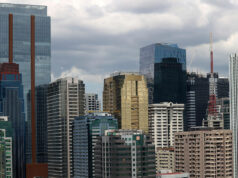Gov’t makes partial award of 7-year bonds
THE GOVERNMENT made a partial award of its offer of seven-year Treasury bonds (T-bonds) yesterday as investors asked for higher rates.
The Bureau of the Treasury awarded just P27.203 billion via reissued seven-year T-bonds out of the P30-billion program, even if the total bids reached nearly twice the initial offer or P52.71 billion.
The papers fetched an average rate of 4.732%, 41 basis points higher than the 4.322% rate quoted during the auction on Oct. 29. If the offer was fully awarded, the papers would have fetched an average rate of 4.738%.
Deputy Treasurer Erwin D. Sta Ana said the turnout was good despite higher rates since the accepted rate of the securities were still within the prevailing rates at the secondary market.
According to the PHP Bloomberg Valuation Service Reference Rates published on the Philippine Dealing System’s website, the seven-year bonds were quoted at 4.684% at the secondary market on Tuesday.
“It’s a good turnout. We were able to raise more than P27 billion in this auction. The approach of the auction committee was to award at a rate that is close to where the security is in the secondary market,” Mr. Sta. Ana told reporters after the auction.
Mr. Sta. Ana explained that the increase in rates were mainly due to inflationary concerns due to the Taal Volcano eruption, as well as risks to oil prices.
“We have observed that over the past couple of weeks, there has been an uptick in interest rates. The Treasurer mentioned yesterday the market may be pricing the inflationary impact of the Taal Volcano eruption. Of course there’s always that risk in oil, although now it is a little bit stabilized,” he said.
Sought for comment, a bond trader said the average rate seen for the bonds yesterday fell within market expectations.
“Interesting to note though that the total bids submitted was way over the offer volume of P30 billion, yet only P27.203 billion has been awarded. Looks like the other half of market participants wanted it to be within 4.8% or higher,” the trader said in a phone message.
Department of Finance (DoF) Secretary Carlos G. Dominguez III earlier said the inflationary impact of Taal Volcano’s eruption will likely be minimal as production of food in other regions can compensate for the supply.
However, for Jun Trinidad, economist at Philippine National Bank (PNB), the eruption could cause food prices to spike, especially on chicken and pork. He said January’s inflation rate can pick up to three percent from the 2.5% recorded in December.
Taal Volcano erupted on Jan. 12, forcing thousands of residents to evacuate their homes for safety. Ashfalls were felt in nearby areas and even in Metro Manila.
In a report, the National Economic and Development Authority (NEDA) said foregone income from Taal’s eruption could reach up to 4.314 billion, translating to 0.17% of the region’s economic output in 2018, with the largest losses to be incurred by the agriculture and fishery sector at P3.167 billion.
The Treasury has set a P420-billion local borrowing program this quarter, broken down into P240 billion in Treasury bills and P180 billion via T-bonds.
The government plans to raise P1.4 trillion this year from local and foreign lenders to plug its budget deficit, which is expected to widen to as much as 3.2% of gross domestic product. — Beatrice M. Laforga



